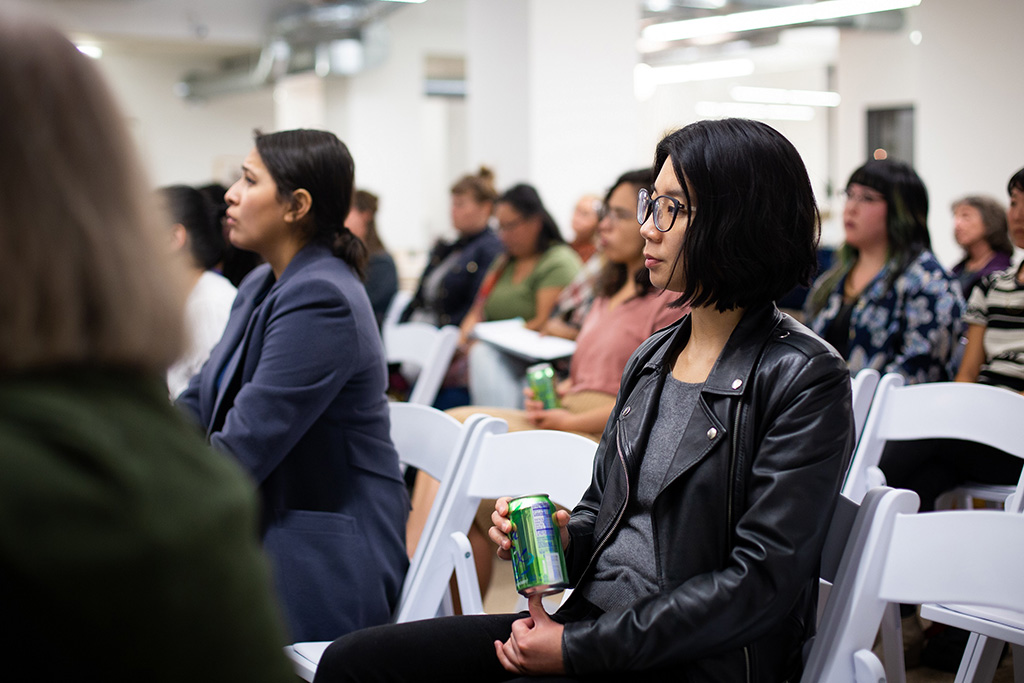By Kai Curry
Northwest Asian Weekly

Womxn listening to speakers at a Riveter Roadshow event in Portland. (Photo courtesy of Riveter and Future for Us.)
“[Women of color] feel they can’t be themselves at work, feel like they need to downplay their ethnicity.”
Sage Ke’alohilani Quiamno is the co-founder of Future for Us, a self-described “platform dedicated to advancing womxn of color at work.”
Future for Us is partnering with Riveter for the State of Womxn of Color Roadshow in Seattle and nationwide.
“We were both frustrated…We were tired of not being invited to events. We needed something to build community, to build fellowship, to share resources,” said Aparna Rae, Future for Us co-founder. “We want to see women of color getting great jobs…and ultimately, positions of power, where they lead decision-making in organizations.”

Yasmin Ali, founder of Skillspire, will speak at the Riveter event in Seattle on Nov. 8. (Photo by Kai Curry)
The event, scheduled for Nov. 8 in Seattle, is part of the Womxn of Color Roadshow 2019, and includes seven cities around the United States. Speakers currently slated for the Seattle event are Michele Storms, executive director of the ACLU of Washington; Raquel Sanchez of the Fred Hutchinson Cancer Research Center; Yasmin Ali of Skillspire; and Nikita Oliver of the Seattle People’s Party.
According to the McKinsey & Company 2019 Women in the Workplace report, while some improvement has been made over the past five years in terms of representation of women of color in the workplace, there remains much to be done. As recently as last year, progress was considered stalled, and even with some small repairs, women still find that gender and color are barriers to their advancement and they continue to experience pay inequities, as well as microaggression from their colleagues. “The State of Womxn of Color: The Future of Work Belongs to Us” will address the situation and offer an inclusive space for discussion of the challenges women of color face today.
The event aims to provide examples to the community of strong women of color leaders, and act as a springboard for further action together.
One of the speakers, Ali, is such a leader. She started her company, Skillspire, to offer coding classes to immigrants.
“When they come here, they are kind of lost,” said Ali. “They don’t know what to do. They don’t have a mentor who can guide them. They don’t have affordable education. Universities take a long time—if they don’t have the money.”
Ali set out to provide a bridge to better jobs. An immigrant herself from India, Ali acknowledged with a smile that, while she undoubtedly experienced difficulties when starting her company, “I take that as a challenge and keep marching on.” Ali remembered that when she was seeking funding for Skillspire, she was often turned down, most likely because she was a woman and a woman of color. Luckily, she had the grit to keep going, yet women’s qualifications are constantly challenged.
“Work wasn’t designed for women,” suggested Rae and Quiamno. “Work wasn’t designed for Black and brown women…Work is designed for white men. For women at large to navigate those spaces is a challenge. White men get the benefits without having to show credibility. Women of color are most likely to be seen as not credible.”
Because of this, women of color often believe they have to act like men to get ahead. Ali remembered when her son, who is 17, said to her, “Mom, you’ve got to be ruthless to be a business woman, to make it in the startup world.” Ali responded with a confident, “No. I’m going to be me. I’m going to do what resonates with me. I’m going to be my genuine, authentic self. I don’t have to be somebody different.”
As everyone involved in the event agrees, women should not have to compete with men on a playing field that is uneven. In fact, our whole concept of competition and work in the United States could use some revamping, Rae explained.
“We’re doing…things we see men do to be successful, pushing people off the ladder, because we want to be at the top, [but this is] largely not a feminine style of leadership…we’re all struggling to overcome a construct that values individual growth over collective empowerment.”
Ali added, “We bring some skills to the business world, like empathy, emotional intelligence, and trying to understand how to work with teams. Those are things that women excel in and we need to capitalize on those things.”
It is expected that by the year 2025, white people will be in the minority in the United States.
“We’ll have a country that will be mostly people of color versus white folks,” explained Riveter’s Senior Director of Diversity, Equity, and Inclusion, Jodi-Ann Burey. “This ceiling of holding people of color back—there will be a swell. You can’t continue to keep people of color in the lower level of work. There are a lot more women running for and in office and running businesses. We can celebrate those things, but it’s still not enough…people are continuing to push barriers.
We’re still breaking into new spaces. That’s already a signal, [and] even though we’re trending in the right direction, it needs to happen at a faster rate.”
For information about Skillspire and its courses offered in Bellevue or Renton, visit skillspire.net.
To learn more about the State of Womxn of Color, visit theriveter.co/events/state-of-womxn-of-color-the-future-of-work-belong-to-us.
Kai can be reached at editor@nwasianweekly.com.



